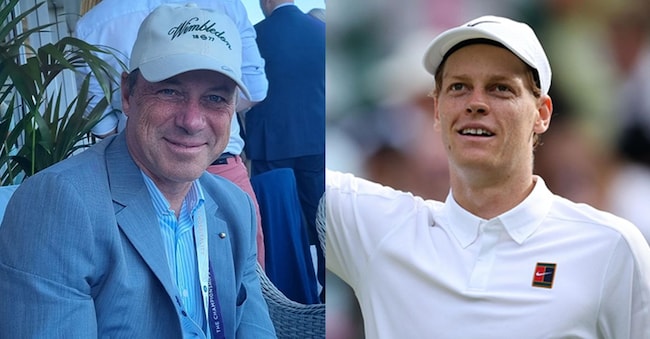Lavazza: "We've believed in Sinner since he was 17."


"We wanted to sponsor a young Italian player. We were interested in showing this sign of interest, and a very experienced collaborator of ours told us, 'You have to focus on Jannik. The others can become good, but in my opinion he's phenomenal.' Sinner was 17 years old and was ranked 140th in the ATP rankings." Giuseppe Lavazza, president of the company, increasingly linked to tennis (it is present at Wimbledon, Roland Garros, the US Open, the ATP Finals, Shanghai, and Madrid), recounts in the lounge near Court 1 at Wimbledon how the association with the world number one came about. Sporting, of course, a white Grand Slam cap with the champion's signature.
Nobody knew him back then. It was Benito Perez Barbadillo (Rafa Nadal's communications manager, who is still very close to the family, ed. ) who pointed him out to us. Thanks to him, we won the bet. Berrettini and other promising players were there, but then Jannik exploded. I still remember when he entered the Finals as a substitute, like a kid who needed to be pelted with balls, and the following year he beat them all... it all happened very quickly.
You know him well, what do you think of him?
He's a very serious, highly focused professional, with total dedication: from a sporting perspective, he's an absolute role model. He remains a simple person; when I see him, I feel like I'm talking to one of my own children (three, a 25-year-old, a 24-year-old, and a 22-year-old— editor's note ). Despite being a great champion, he remains simple, and this makes him even more special, both as a man and as a professional. Naturally, he's a determined person; he knows what he wants, he takes risks, he has a unique ability to control himself on the pitch, a very measured body language ; it's difficult to understand what's going on in his head.
Did the doping story raise any doubts for you?
Knowing his integrity, his iron discipline, his mentality, not for a moment. We were always certain it was an accident. And beyond the medical reports—which confirmed that the amount of the substance was so microscopic that it didn't contribute anything—we were already more than convinced the whole thing was unfounded.
What values do Sinner and Lavazza share? How has it been watching their growth over the years?
Determination to reach your goal, a spirit of sacrifice, leveraging your own abilities, including the capacity for suffering. Even in business, you can fall, but then you have to have the strength to get back up. You don't have to win every point, but you have to win the right points. Understanding that you have limits and that what matters is doing better than the person you're competing against.
Why did Lavazza choose tennis? How did this connection begin?
It was born by chance. In 2011, IMG (the American sports marketing company ) contacted us to ask if we were interested in coming to Wimbledon. I was the company's marketing director at the time, and I accepted. I had never been there, but I had the opportunity to see the setting where the world's greatest players played, from Nadal to Federer to Djokovic. I was struck by the place, which I had always seen on TV, admiring the sacredness of the centre court. I understood there was potential for coffee, considering the number of people who came every day. It was a product that was missing; it was there, but without a real identity. It seemed like an extraordinary place to have coffee, a magnificent, enormous coffee shop with many different uses: for players, for the public, for club members, for the press, for the queue , with the option of customizing the menu and the coffees. Coffee and tennis go together beautifully. We began to understand that it was a tool for building a network of relationships, for offering a unique experience to our stakeholders . So much so that after Wimbledon, in 2013 we began sponsoring Roland Garros, then we entered the US Open, then the Australian Open, where we stayed for a few years... with Covid, we had to make some choices and we left Melbourne. Right now, China is an important market for us.
And Italy?
We're at the Finals. Turin is our city, and it was important to commit ourselves to bringing the tournament there—it wasn't guaranteed—and to support the project when the city submitted its bid: we were a highly respected tennis company.
Will you continue in Milan too?
We don't know yet, it's yet to be decided. In the meantime, we still have a few years in Turin. The Finals are a very good product, in terms of audiences. They're well-organized, the quality is very high, the crowd is enthusiastic, there's a lot of technology and a great show. It's the only indoor tournament we do.
Is there any real, empirically measurable impact from sponsorship? What's your experience?
With tennis, we've built a path of enormous visibility for the company; we've managed to get millions of people to try our product. It's an investment that has paid off tremendously, and we'll continue to do so. Tennis has also given us a lot on the communications front, especially in terms of engaging with social media. It's a vehicle for promotion and networking at all levels. And it's a sport that's grown enormously, becoming a global phenomenon. The audience is large, and it's followed by people of all kinds: younger and older, there's no gender difference. The crowds also work well: there's no disruption, just cheering, applauding, and nothing more.
News and insights on political, economic, and financial events.
Sign upilsole24ore




